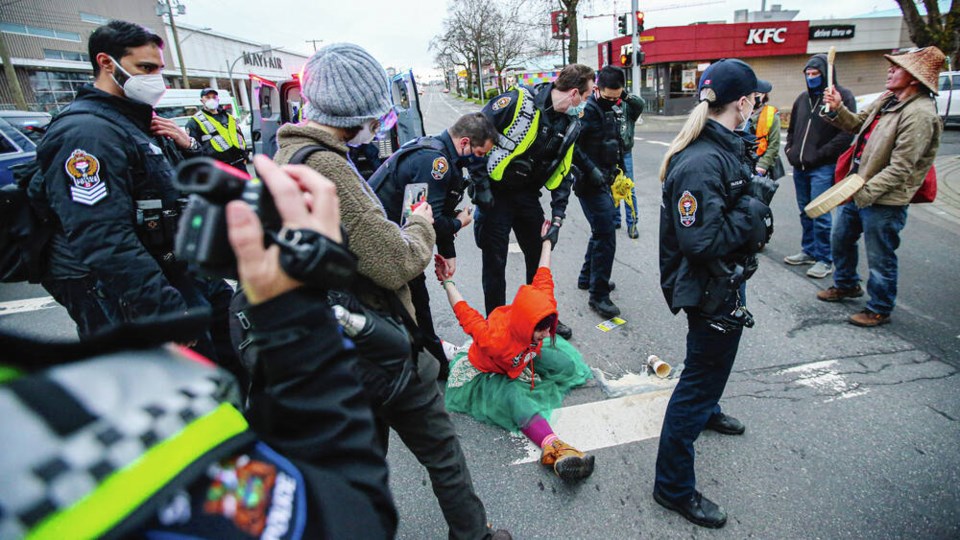Saying it’s paying more than its fair share for police services, Esquimalt council has rejected a request from Victoria police to fund 10 new positions.
Mayor Barb Desjardins, who is deputy co-chair of the Victoria and Esquimalt Police Board, cited a 2020 Ministry of Public Safety study that determined Esquimalt’s declining calls for service and low crime rate meant it was paying for resources it was not using. “Council felt that given that report came out two years ago and we still have more resources than we need, we couldn’t in all conscience add more resources,” she said.
Last year, Esquimalt paid $8.4 million — 14.7 per cent of the total police budget — for policing, or about $479 per Esquimalt resident.
While Esquimalt approved the core police budget, it did not approve funding for the 10 new personnel — four civilian positions and two officers for the Assertive Community Treatment team, two officers who would be part of a co-responder team with Island Health, a cultural liaison officer to build bridges with the Indigenous, Black and people of colour communities, and a sergeant to work on cybercrime.
Victoria’s council has approved the Victoria police core budget, as well as the $1-million funding request for the new positions.
The department requested a budget of $63.4 million, up from the 2021 budget of $59.2 million.
Desjardins said her council is aware costs are rising, including overtime and expenses resulting from protests downtown.
“While police presence is important for these types of events, Esquimalt should not be the only municipality in the region contributing to these costs simply because Vic PD provides policing in our township,” she said. “Public safety is top of mind, as is appropriate spending for our services. Our goal is to be adequately policed while fiscally responsible to our residents and businesses.”
Desjardins said her roles as mayor and as co-chair of the police board are in direct conflict on the budget issue. She supported the budget and resource request while sitting at the police board table, but couldn’t do it back home in Esquimalt.
“That’s the biggest challenge. We have a police board trying to meet the needs of two very different communities and one requires significantly more resources — Victoria’s crime severity index is three or four times what Esquimalt is,” she said. “So I have to support [the budget] at the police board when that’s my focus, because [Victoria] and the board need the resources. But I cannot support it in Esquimalt.
“My fiduciary duty is to my community and when I’m sitting at the police board, my duty is to that organization,” she said. “So yeah, I do it differently at both tables because of my duty to each organization.”
Victoria Police Chief Del Manak said he was disappointed the police budget was not approved in its entirety, and took issue with the suggestion that the officers were extra.
“The 10 additional positions for 2022 were not a supplemental request. Instead, they were deemed by our board to be an essential component of the overall core budget request for VicPD,” he said. “This budget was recommended and approved by the Victoria and Esquimalt Police Board as the minimum budget required to provide adequate and effective policing for the City of Victoria and the Township of Esquimalt.
The Victoria police budget requires approval by both Victoria and Esquimalt councils.
Manak said personnel shortages and increasing demands on officers are affecting the force’s ability to provide the community policing that citizens expect.
The current Police Framework Agreement, which governs the Victoria and Esquimalt amalgamated service delivery, is up for renewal this summer.
Esquimalt has been clear it is unhappy with the current arrangement, and Desjardins said they are engaging with the community to determine if they will renew the agreement.
“We’re doing public consultation in the next couple of months to find out what the people feel about how this framework agreement has served them in terms of cost, and in terms of service,” she said.
Police governance is often contentious. Municipal police departments report to arms-length boards, not municipal councils, to shield them from political interference. At the same time, policing represents a large portion of municipal budgets.
Last week, the Vancouver Police Department announced it had won an appeal to the provincial government, forcing Vancouver city council to restore $5.7 million it had cut from the 2021 police budget.
Similarly, in 2019 the province reversed Esquimalt council’s 2018 decision to turn down the hiring of six additional officers for VicPD. However, the province later turned down VicPD’s appeal of Victoria council’s decision not to fund two officers for mental-health teams.
The relationship between Esquimalt, Victoria and the police department they share has been contentious ever since the province forced the merger of the two municipalities’ departments in 2002. That was expected to be the first step toward the creation of a regional police force, but that plan stalled in the face of opposition from many municipalities.
Esquimalt tried to break away from the forced marriage a decade ago but was rebuffed by the province.
Last year, former Vancouver deputy police chief Doug LePard, now a consultant, submitted two reports on the situation, including one focused on the “rubbing points” where friction occurs in the agreement under which Victoria, Esquimalt and the police board operate.



